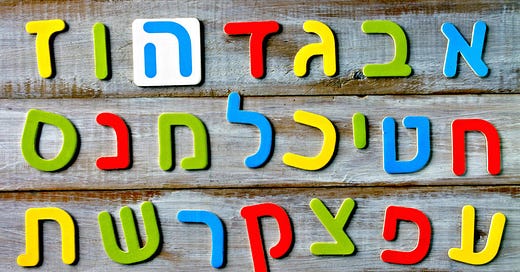Kesivah v’chasimah tovah to everyone reading this. Thank you for giving these thoughts your time and for offering feedback/pushback. IyH I’m looking forward to continuing come 5785.
One of the main roadblocks to serious learning and davening — the two most basic avenues to developing a relationship with Hashem — for Diaspora Jews is the language barrier. Not knowing the meaning of the words makes davening into an empty sing-song and closes the door to independent engagement in learning. (I’ll note that this is not a silver bullet — Israelis struggle with davening, as well — but without understanding the words, we’re not even trying).
Classically, we’ve relied on our schools to teach Hebrew. I think it’s fair to say that that hasn’t really worked. My impression from teaching in a post-high school yeshiva and involvement in a summer camp for teens indicates that most students are not developing anything approaching fluency. A majority of students who come to Israel are not yet fluent in any sense of the word, whether reading or speaking, necessitating a lot of work until they can really have a shot at taking off as independent learners and inspired daveners.
To be clear, you can’t really blame the schools for this. Every school has a long list of subjects and ideas they are looking to convey; they just can’t afford the amount of time real Hebrew education would take. Ivrit b’ivrit may be a solution that actually works, but the dearth of schools that actually do it seem to indicate that it isn’t going to be the solution for most people.
But what if instead of relying on the school to teach Hebrew, only starting at the age of six or older, parents took responsibility for this on their own? From infancy, parents can already begin mixing in Hebrew words and books to their reading time.
Chazal’s Idea, Not Mine
To be honest, this is not a new idea. In fact, its a very, very old idea: Chazal already instructed every parent to do this for their children. Variations on this theme are found in the Tosefta to Chagiga 1:2 and Yerushalmi Sukkah 3:12. The Torah Temimah records it as a Sifri commenting on the phrase from k’rias Shema, “l’daber bam” (Devarim 11:19):
When a child begins to speak, his father should begin to speak to him in lashon hakodesh and teach him Torah. If he does not speak to him in Hebrew and does not teach him Torah, it is considered as if he buried him…
In his notes, the Torah Temima shares that he wrote a sefer called Safah L’ne’emanim about the significance of this mitzvah and his astonishment at the fact that the standard codifiers of halachah don’t record this mitzvah. He also points out that the Rambam highlights the importance of a parent doing this for his child — not in the Mishneh Torah, but in the Peirush Hamishnayos to Avos 2:1, using it as an example of a mitzvah that people often consider to be a mitzvah kallah, relatively insignificant.
Report From the Field
One friend who has already been doing this for a couple of years reported:
Speaking Hebrew with my kids and reading to them in Hebrew has been very rewarding. It’s not easy and has many challenges, but the moments when they remember how to say something or don’t ask you what something is in English makes it all worth it. A few times, they even respond in Hebrew!... This is an important aspect of the chinuch I’m trying to provide for my family.
Wow! And all it really takes is stacking a small “library” of children’s books in Hebrew and mixing them in on a regular basis, such as one a day, or speaking in Hebrew with your child for five minutes every day. Through this exposure, they start building their familiarity and comfort with the language from a very young age, which is one of the most important factors in future language competence.1 A particularly motivated person who wants to make this their contribution to their community can organize a book swap within the community, or offer a monthly “book box” featuring a new age-appropriate book in Hebrew for families that register.
A twist on this, if relevant, is to combine screen time in appropriate shows with teaching Hebrew by putting on the Israeli version instead of the English version. A friend who did this for just a few weeks, sitting with his three-year-old daughter (which he was doing anyway to ensure the content was in line with our values) and explaining what was happening when needed, reported that she had already picked up a few words and was able to figure out what was happening on her own. Parents facilitating comfort with Hebrew from an early age could be a significant game-changer in our community’s connection to Torah, tefillah, and Hakadosh Baruch Hu.
https://www.researchgate.net/publication/259822414_Bilingualism_in_the_Early_Years_What_the_Science_Says, specifically 5: Is Earlier Better?




